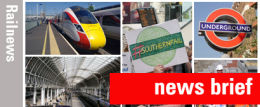Posted 10th March 2021 | 2 Comments
Train operators call for ‘level playing field’ over tax

THE interim findings of the Union Connectivity Review by Sir Peter Hendy have been published today and the rail industry is critical of proposals to reform Air Passenger Duty on domestic flights, although the report does make it clear that it will concentrate on journeys which are ‘not realistic by rail’.
Rail Delivery Group director general Andy Bagnall said: ‘Funding to look at developing better rail links between England, Scotland and Wales rightly recognises the key role trains will play in a future decarbonised transport network. Rather than considering a cut to air passenger duty in isolation, government should ensure there is a level tax playing field across cars, planes and trains with each paying according to the environmental impact they have. This would encourage people to make greener choices to get from A to B such as taking the train.’
Rail travel in Britain has not been taxed since the 1920s and there is no VAT on rail fares, unlike in some EU countries.
The industry also called for ‘clearer and simpler’ tickets for passengers in its submission to Sir Peter’s Review, which the RDG says would make up to 80 per cent of ‘walk up’ off peak long distance tickets cheaper.
One key recommendation in the Review is the possible development of a new UK Strategic Transport Network. This could echo the way that the Trans-European Transport Network was designed to support the European Single Market through improved connectivity and the closure of gaps in existing cross-border transport networks.
The interim Review explains that ‘the development of a UK equivalent could support better assessment of transport routes and investment decisions, better management of the flow of people and goods between nations and improved partnership working between the UK government and devolved administrations’.
Other proposals include an upgrade of rail connections between North Wales and Merseyside, upgrades of the West Coast and East Coast Main Lines, faster and higher capacity passenger and freight services from HS2 and other railways to Scotland and North Wales and also greater capacity and faster journeys between Scotland and England, Wales and Newcastle by rail. A fixed link between Scotland and Northern Ireland is also being considered.
Reader Comments:
Views expressed in submitted comments are that of the author, and not necessarily shared by Railnews.

Gregory T, London
A review is, of course, a way for the Treasury to kick the can down the road a bit further, whilst actually increasing costs, of course.
Oh & spending money on bionic duckweed & Hydrogen, rather than, you know - electrifying everything.
Depressing, isn't it?
Christopher Jones-Bridger, Buckley Flintshire
I suppose another review is to be applauded & just like so many previous reports added to the ever sagging bookshelves full of previous reviews to gather dust & be forgotten. A familiar pattern of review, announcement, further consultation and continued lack of action, change Transport Secretary return to go & repeat.
While there has been much speculation regarding a fixed like between Scotland & Northern Ireland can this be tempered by some estimation of likely demand. While freight demand is currently satisfied by existing sea links, either RoRo or bulk/container shipping, passenger demand has changed dramatically during my lifetime. While once rail had an important role in the market this is now very marginal due to the dominance of the low price air operators & availability of RoRo capacity for car journeys. Following Brexit there is obviously a political spin on a fixed link but the market is already evolving as ferry operators have adjusted their capacity to avoid the traditional routes by introducing direct sailings from mainland Europe to Ireland avoiding the UK.
If we're going to invest in infrastructure let's do something to get the basics right. There is no lack of schemes that are waiting to go to invest in the existing rail infrastructure to improve today's performance. Even basic road repairs like filling the humble pothole would give a positive economic boost now with even rail benefiting as the freight operators do the initial bulk haul of the materials from the quarries. Building back better does not have to equal a major vanity project to satisfy a politicians inner ego, just remember what happened to London Thames Estuary Airport & the London Garden Bridge .
The pandemic has seen all transport modes badly affected. Today's suggestion of a cut in air passenger duty following the freezing of fuel duty for road transport again in the recent budget show different priorities to rail where the annual fare rise was still belatedly applied. While rail has been on life support during the crisis once the economy reopens it will face the same difficulties as competing modes to recover. However double standards do seem to be applied to rail's predicament allowing some competitive advantage to the principle competitors.